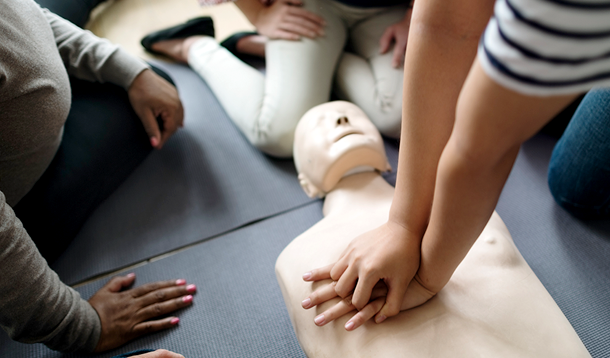
The instructor looked like Robin Williams – so much so, he had to address it at the begin of the class to curb whispers. We were residence assistants (RAs) and CPR/First Aid certification was part of our mandatory training. I knew the basics of CPR from my swimming classes as a child. I thought I knew first aid well enough (spoiler alert – I didn’t.) I was shy, and there were people in this class. I really didn’t want to be there.
As the day went on, I first learned how little I actually knew what to do in a crisis, and then began to feel more confident in my ability to handle an emergency if one arose. By the time the class ended, I was incredibly glad for the opportunity of taking it.
This was seventeen years ago, and I still remember Robin’s doppelganger assuring us that if we were scared to do CPR, we needed to remember two things:
If you are doing CPR, the person is dead. They are in the worst shape they can be in. You cannot make them more dead. Doing CPR can only make them better or stay the same.
If you do CPR and the person still doesn’t live, their family will still be thankful to you for trying.
He told us that CPR isn’t like on TV – it almost never brings someone back on its own – but that it is vitally important for keeping someone’s brain alive long enough for paramedics to revive them with shock. Essentially, he empowered us to do everything we could, while giving us a realistic vision of what it would look like.
When we moved on to the first aid section, I learned how misinformed I had been about so many things. How often do you hear people say to put someone with a high body temp into an ice bath? Or to put toothpaste or butter on a burn? We pass down this “sage wisdom” but it’s wrong and often harmful.
I walked away from the seminar feeling like I had important tools I never knew I needed. I felt more secure, more knowledgeable, and more confident.
I would take CPR and First Aid several more times after this session. It was required for my job as a daycare teacher. I also took refresher courses while pregnant with each one of my children, and took an online course refresher two years ago. It seems like overkill, but think about how easily you forget things you learned in high school and college – when the pressure is on, would you trust yourself to recall something you learned in one afternoon twenty years ago?
By now, you might be wondering what the point of this article is. It’s a call to action. No one expects to find themselves in an emergency situation. By their very nature, emergencies appear out of nowhere and the only chance of a good outcome is quick action.
Consider this story: A Canadian man on vacation in Florida suddenly and without warning collapsed from a heart attack. Two women came across him and knew to immediately, before doing anything else, call 911. While one called, the other stopped a man who knew CPR. The man, having taken several courses in the past, did not panic, and administered CPR until first responders got there and revived the lifeless man. https://www.cbc.ca/news/canada/new-brunswick/fredericton-heart-attack-florida-reddon-macneill-arseneau-1.5101752
Because they knew what to do, they stayed calm and went into action without losing valuable time. The man lived and recovered. "For my type of [cardiac] arrest, the success rate is not very high, so to have somebody there to immediately call 911, to do CPR and to have a hospital close by … and to have cardiac surgeons on hand to fix me up, I mean, it's amazing that everything fell together so well for me," he told CBC.
The friend who was with him didn’t know CPR. If the women who called 911 and found help hadn’t happened by, and if the man they stopped didn’t know CPR, this absolutely would have had a different outcome. His friend signed up for CPR classes as soon as he returned home to Canada.
But it isn’t just life or death situations. If your child falls and bangs their head, do you know what to do? What if you are home alone, making dinner, and you cut your finger deeply, or scald yourself?
What if someone is choking, do you know what to do? Our instructor told us two stories of times he saved the lives of choking people. One was a baby, choking on her mother’s earring. The other was his friend with whom he was having a casual lunch when she aspirated a bite of tuna sandwich.
What about safety hazards? Do you know what to look for? Our instructor told us one of the most dangerous items to infants and young children are the corners you cut off milk bags. They easily block airways and cannot be removed with the Heimlich maneuver. I had no idea.
There is too much to list here, but the point is clear. Knowledge is power, and the more you refresh your info, the better – and calmer – you will be able to recall it if you need it.
I cannot urge you enough to sign up for CPR and First Aid courses. Best case scenario, you never need to use them, but you don’t ever want to find yourself in a position where you wish you had.
Courses are available through the Red Cross https://www.redcross.ca/training-and-certification and through St. John Ambulance https://www.sja.ca/English/courses-and-training/Pages/default.aspx . You may be able to find other organizations as well, but make sure they are accredited and offer proper certification.
While you are waiting for your course to start, here is some basic info on CPR (remember to call 911 before starting CPR):
https://www.mayoclinic.org/first-aid/first-aid-cpr/basics/art-20056600
https://myhealth.alberta.ca/Health/pages/conditions.aspx?hwid=sid44428
Some info on choking:
https://www.mayoclinic.org/first-aid/first-aid-choking/basics/art-20056637
And some basic first aid procedures:
https://www.verywellhealth.com/basic-first-aid-procedures-1298578